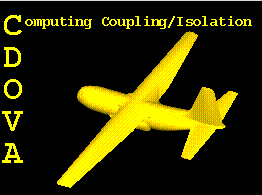
METHOD
The computational kernel of C-DOVA is based
on Uniform Theory of Diffraction (UTD) and
various Differential Geometry techniques.
Based on user's choice of the
- model
- transmitting antenna
- type
- position
- physical characteristics
- receiving antenna
- type
- position
- physical characteristics
- frequency range
C-DOVA
- builds propagation paths between transmitting
and receiving antennas,
- automatically classifies diffraction mechanisms
along each
propagation path,
- computes all geometric data required for the EM calculations,
- computes and integrates coupling gains due to
different
diffraction mechanisms,
- displays computed results graphically.
|
|
WHAT does CDOVA do?
C-DOVA
system is a computer code for calculating numerically electromagnetic
(EM) coupling gain between Transmitting and Receiving Antennas
mounted on geometrically complex platforms.
The platforms are
represented electronically by computer models generated with CAD
(computer Aided Design) packages. Such models are available from
many sources, including platform manufacturers and commercial
vendors specializing in producing electronic models of different
objects. Models can also be created in-house with many of the existing
CAD codes.
CAD-generated models usually represent the actual platform with high
accuracy and with C-DOVA on a can take advantage of this fact and
obtain accurate predictions of antenna performance.
FEATURES
highly efficient overall performance permitting fast calculation of
antenna coupling gains for a range of frequencies,
intuitive interactive and visual environment with a user-friendly
interface,
capabilities for interactive re-positioning of antennas thereby
allowing to play “what-if” scenarios in the design and analysis cycles,
extensive on-line help,
powerful 2D and 3D visualization components that allow
- to see and manipulate 3D models and computed paths in real
time,
- to plot, view, and print plots of gain vs. frequency.
|
